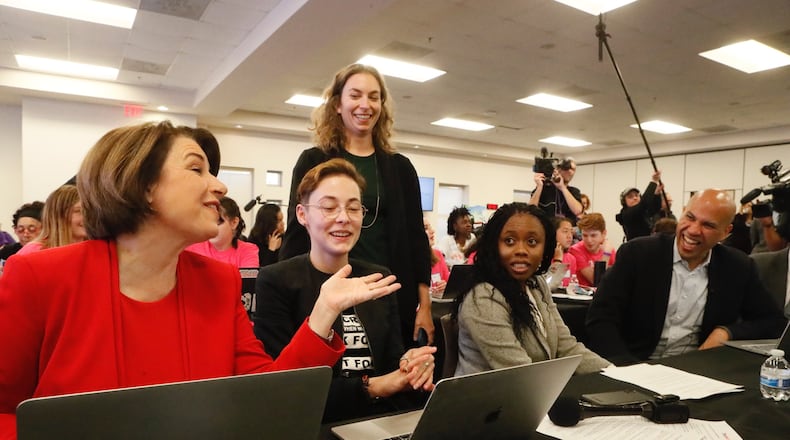Democratic presidential candidates sent text messages to some of the 313,000 people Thursday whose voter registrations could be canceled in Georgia, emphasizing their support for voting rights a day after their debate in Atlanta.
U.S. Sen. Cory Booker, South Bend Mayor Pete Buttigieg, U.S. Sen. Amy Klobuchar and entrepreneur Andrew Yang participated in a phone and text bank to prevent dormant voter registrations from being canceled next month.
Using a computer program to send dozens of text messages at a time, the candidates raced to reach as many voters on Georgia’s cancellation list as they could. When voters responded, the candidates interacted with them, looked up their registration information and told them how to re-register before it’s too late.
Photos: Presidential candidates make their pitch in Atlanta
Related: Democratic candidates take an extra day in Atlanta to woo black voters
The candidates joined Stacey Abrams and her Fair Fight Action voting rights group at Ebenezer Baptist Church, where the Rev. Martin Luther King Jr. was pastor.
“This is an assault on our democracy. This is what generations past have fought for,” Booker said. “The struggles of our past, the ground that was gained, a lot of that is being eroded right now. That’s unacceptable.”
Many of the people who responded to the text messages told the candidates they already moved away, but some are at risk of losing their registrations under Georgia's "use it or lose it" law, which removes infrequent voters every other year.
About 121,000 of the registrations are being canceled for inactivity since 2012 or earlier; the other 192,000 either filed change-of-address forms or mail from election officials was returned as undeliverable.
Secretary of State Brad Raffensperger pushed back against the text messages Thursday, which asked voters to share their birth dates and counties for the purpose of checking their registration status.
Related: Bernie Sanders touts $10B plan to boost HBCUs
Related: White House hopefuls focus on civil rights at Sharpton's breakfast
Raffensperger said in a press release that voters shouldn't give their personal information to groups such as Fair Fight Action. He said voters can check their registration themselves online or call a state government hotline.
Voter registration purges became a major issue in Georgia after the state canceled about 534,000 registrations in July 2017, the largest single removal of voters in U.S. history.
Republicans reject accusations that they’ve created barriers to voting, pointing to Georgia’s record 7.4 million registered voters and its automatic voter registration program, which signed up more than 700,000 new voters when they got their driver’s licenses over the past three years.
Klobuchar has introduced legislation that would prevent states from using someone’s failure to vote as a reason to remove them from voter rolls.
“Think of how ridiculous this is in 2019. Please tell me why you have to purge names of voters and you can’t figure this out,” Klobuchar said. “I think the easiest way to do this is register every kid when they’re eligible to vote when they turn 18.”
Buttigieg said voting rights are important because they affect every other issue.
“There are some in politics who have decided the best way for them to win is to ensure that not as many people get to vote,” Buttigieg said. “That’s why defending our elections is so critical.”
Since Abrams, a Democrat, lost to Republican Brian Kemp in last year’s election for governor, her supporters have rallied against voter registration cancellation laws like those in Georgia.
Several of the Democratic presidential candidates have said they believe Abrams would have won if not for laws that she says make it difficult to vote.
Related: Atlanta reacts | Who won the Democratic presidential debate?
Photos: Democratic presidential candidates debate in Atlanta
Related: Impeachment hearings play lead role on Democratic debate stage
Election officials mailed letters last week to people whose registrations could be deleted, but that precaution isn’t adequate, Yang said. Voters have 30 days to return the postage-paid letter to preserve their registrations.
“Reaching out to folks and letting them know that their right to vote is somehow being questioned is a valuable public service,” Yang said. “Right now the notification process is not foolproof, and if you’re the average busy American, you’re not necessarily going to be keeping up with the information we have on file for you.”
This year’s round of cancellations represents 4% of the state’s 7.4 million registered voters. Raffensperger released the names of the voters who are scheduled for cancellation, and Fair Fight found some of their phone numbers.
Voter registrations can be canceled after three years of inactivity followed by no contact with election officials during the next two general elections.
Fair Fight is suing the state over the obstacles that voters faced at the polls last November, including the "use it or lose it" law, missing registrations, long lines, precinct closures and rejected ballots. That lawsuit is pending in federal court, with a trial scheduled for next year.
About the Author
Keep Reading
The Latest
Featured






